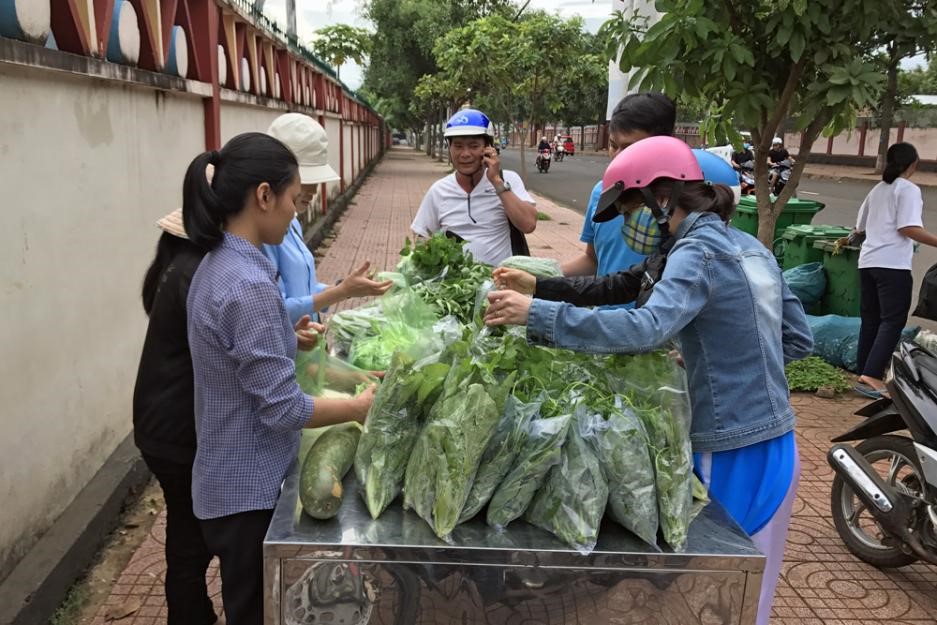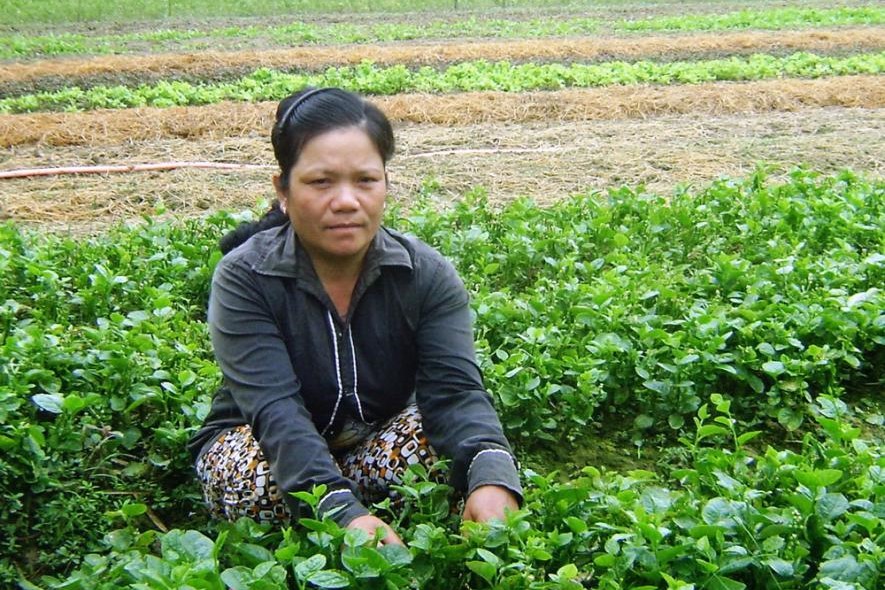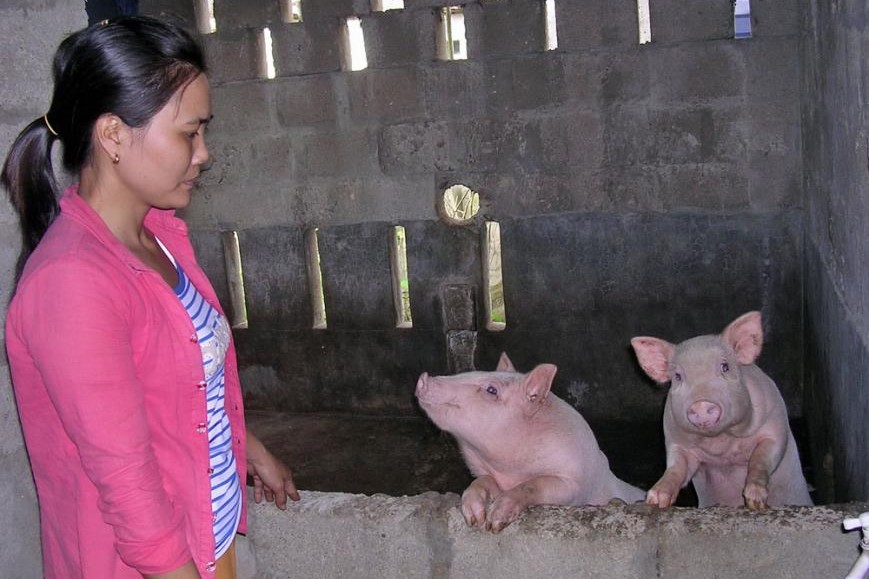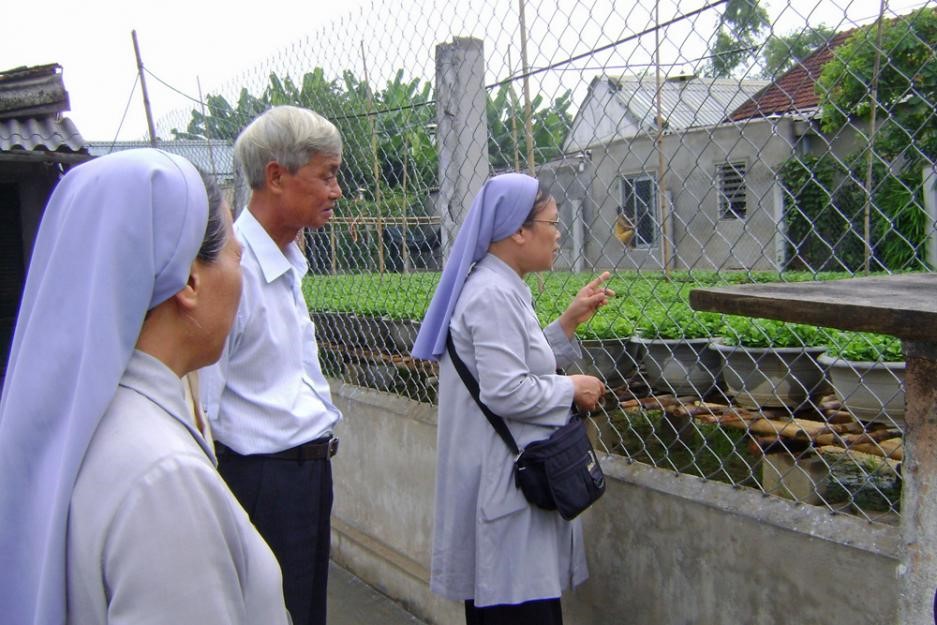
People buy organic vegetables in front of a convent of the Mary Queen of Peace Congregation in Buon Ma Thuot City. (Joachim Pham)
Consider the following questions by yourself or with a partner:
- What did you have for lunch yesterday?
- What factors do you consider when you decide what to eat?
- What are the names of four people who help get food to your table?
For many of us, food is just something that we eat to fuel our busy days. We don't give much thought to how it's grown or how good it is for us compared to other choices we might make. Cost and taste often take priority over a food item's nutritional value or its impact on the environment.
A growing number of farmers in Vietnam are, with help from congregations of sisters, changing the way food is raised. As you read, think about the food you eat every day and the efforts that were made by farmers and others in getting it to you.
Farmers benefit from organic farming initiated by sisters
by Joachim Pham
Mary Tran Thi Thu is busy every day watering, weeding, hoeing and fertilizing vegetable beds on her 3,000-square-yard farm.
Thu, 52, uses traps to kill insects and butterflies and catches caterpillars by hand to keep them from feeding on crops.
She makes organic fertilizers by mixing pig feces with dry leaves, rice stubble, husks and lime before composting them.
She said she sells some 100 kilograms (220 pounds) of Malabar spinach, snow peas, okra, amaranth, centella, houttuynia, gourds, sweet potatoes and mushrooms to local people and nursery schools every day. Her vegetables cost from 6,000 to 12,000 dong (25-50 cents) per kilogram.
"People prefer our organic produce because we do not use pesticides and artificial fertilizers for vegetables," she says.
"We are happy that we have paid off 25 million dong ($1,100) we borrowed from the bank to build our house in the past," Thu says.
"As Catholics, we grow fresh organic produce for the common good rather than private interests," she says, adding they have to work harder than other farmers in the area who use chemicals to raise vegetables for retail clients.
She also raises poultry and pigs and feeds them rice, cassava powder (similar to tapioca), vegetables and pieces of banana tree trunks. She sells a dozen pigs a year.
Thu is among 40 farmers who provide clean vegetables for local nursery schools. They are from Thanh Trung Parish in Quang Dien District of Thua Thien Hue Province.
Daughters of Our Lady of the Visitation Sr. Mary Elizabeth Duong Thu Huong, who established the group in 2015, said those farmers "aim to grow vegetables, roots, beans and fruits without use of insecticides and chemicals to protect the environment from being polluted by pesticides and to look after people's health."
Huong said she teaches them how to make natural fertilizers, trap insects and choose vegetables suitable for the weather and soils in the area.
Vietnam uses 100,000 metric tons of herbicides and pesticides for agriculture every year, Agriculture and Rural Development Minister Nguyen Xuan Cuong reported last May. Farmers rampantly abuse pesticides and herbicides, creating an imbalance in the ecology and poisoning water sources and soils.

Mary Tran Thi Thu weeds Malabar spinach beds at her farm in the Phu Loc District of Thua Thien Hue Province of Vietnam. (Joachim Pham)
In 2018, Vietnam recorded 164,670 new cases of cancer and 114,870 cancer deaths, according to the GLOBOCAN database of cancer deaths in the world. One of the leading causes of cancers is food contaminated by the overuse of chemicals.
Filles de Marie Immaculée Sr. Marie Nguyen Thi Hiep from Phuong Tay convent says her congregation also helps local women living in places affected by climate change to grow vegetables in plastic or foam barrels.
"We also ask benefactors to offer capital to 20 local households, 5 million dong [$215] each, to raise poultry and cattle and grow vegetables for a living," she says.
Filles de Marie Immaculée Sr. Mary Tran Thi Hien, who gathered 26 farmers to grow clean vegetables at Xuan Thien Parish in 2014, says at first she encouraged them to follow traditional organic farming methods by giving each household vegetable seeds and two piglets.

A Catholic farmer raises two pigs given to her by sisters to make natural fertilizer for her farm in Xuan Thien Parish in the Phu Vang District of Thua Thien Hue Province. (Joachim Pham)
Hien says local farmers make a meager living so, when they have bad harvests, they get into debt. They leave their homes and farms and try to make a living by collecting used items and working at construction sites.
"Many people improve their life, thanks to organic produce that consumers love to buy," she says. They provide organically farmed produce, poultry and pork products for Catholic nurseries and local people.
"Once people are aware of making clean agricultural products, they will be aware of taking responsibility for protecting community health," Hien says.
She says many people abuse chemicals and pesticides because they are not educated on the ill effects chemicals have on human health and the environment, focusing instead on chasing immediate profits.
She says the Filles de Marie Immaculée, also known as the Marianist sisters, have trained 17 parishes in cultivating organic vegetables, preserving food, providing drinking water and preventing illnesses caused by climate change.
Hien says that sisters in rural areas grow clean vegetables in convent compounds for their own needs, while religious communities in cities do not have enough room to do so.

Daughters of Mary Immaculate introduce how to plant vegetables on frames at a farm in Huong Thuy District. (Peter Nguyen)
Sr. Mary Nguyen Thi Thuan from the Mary Queen of Peace Congregation, based in Buon Ma Thuot City, Dak Lak Province, says sisters grow vegetables in farms around their convents to provide food for themselves and sell at least 100 kilograms (220 pounds) of vegetables a day to shops and local people.
Thuan says they also supply clean vegetables to a business in Ho Chi Minh City.
"Some local farmers visit our farms, learn how to do organic farming and apply organic methods to their own farms," she said. "People are interested in organic farming methods."
James Dang Thanh Hoa, from Xuan Thien Parish, says he grows organic vegetables to safeguard the health of his family and others.
Hoa says he harvests 150 kilograms (330 pounds) of vegetables per day and does not have enough produce to provide to local shops, markets or malls, which require far greater amounts.
"We are happy that more and more people from other places come to buy our fresh farm produce," he said.
Reflect on the following:
- Would you rather catch caterpillars with your bare hands, mix pig feces into fertilizer or pull weeds in the hot sun?
- Why does it matter whether food is produced with chemical bug killers, weed killers and fertilizers? What are the benefits of such chemicals?
- If God blessed humans with the wisdom to develop chemicals that grow bigger crops with less effort, what's so wrong about using them?
In the first story of creation in the Bible, God creates humans and gives them a lot of responsibility:
"God blessed them and God said to them: Be fertile and multiply; fill the earth and subdue it. Have dominion over the fish of the sea, the birds of the air, and all the living things that crawl on the earth. God also said: See, I give you every seed-bearing plant on all the earth and every tree that has seed-bearing fruit on it to be your food; and to all the wild animals, all the birds of the air, and all the living creatures that crawl on the earth, I give all the green plants for food. And so it happened. God looked at everything he had made, and found it very good. "
- God gave humans dominion over all creatures and told them to subdue the earth. What do "dominion" and "subdue" mean to you?
- Are choices that humans make that threaten or destroy other creations of God offensive to God, or is God OK with them because he put us in charge?
- How are we responsible to other humans? How can the food choices we make affect other people?
In his encyclical on care for the environment, Pope Francis, recognizes the threat than many chemicals and pollutants pose to humans. He writes:
"Some forms of pollution are part of people's daily experience. Exposure to atmospheric pollutants produces a broad spectrum of health hazards, especially for the poor, and causes millions of premature deaths. People take sick, for example, from breathing high levels of smoke from fuels used in cooking or heating. There is also pollution that affects everyone, caused by transport, industrial fumes, substances which contribute to the acidification of soil and water, fertilizers, insecticides, fungicides, herbicides and agrotoxins in general. Technology, which, linked to business interests, is presented as the only way of solving these problems, in fact proves incapable of seeing the mysterious network of relations between things and so sometimes solves one problem only to create others."
From: "Laudato Si': On Care for Our Common Home"
- Pope Francis emphasizes human solutions to human problems. What might go wrong if we rely solely on technology and science to solve our problems?
- What kinds of choices and sacrifices must people make to reduce their dependency on chemicals and other pollutants?
Some plants mentioned in this article, such as amaranth and Malabar spinach, grow as crops in Vietnam but are considered weeds in the United States. Other common weeds, such as dandelions, clover and purslane, also can be picked, prepared and eaten, usually for use in salads.
Sisters in Vietnam, the United States and around the world promote the growth of healthy, affordable food. Many edible weeds likely are growing in gardens and fields near you. Research edible weeds in your area and how they are safely harvested and prepared. Explore whether your local food pantry or soup kitchen would be open to donations of edible weeds, or whether nearby restaurants or health food stores would buy them. With the permission of local gardeners and landowners, harvest edible weeds.
Visit your local grocery store and compare the costs of produce items labeled as certified organic to similar non-organic items. Also, visit local farmers' markets and ask growers whether they use chemicals to raise their produce. Research the costs involved in food production and distribution. Discuss with your family the benefits and challenges of buying locally grown organic produce.
Bless us, O Lord,
and the gifts we receive through your bounty.
Bless the earth which bursts forth with the food that fuels us.
Bless the farmers and gardeners who use their gifts to nurture nature.
And bless us with the wisdom to take none of this for granted.
Amen.
Tell us what you think about this resource, or give us ideas for other resources you'd like to see, by contacting us at education@globalsistersreport.org